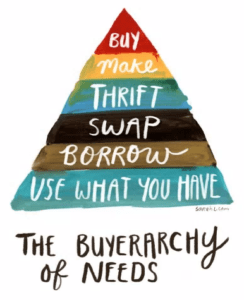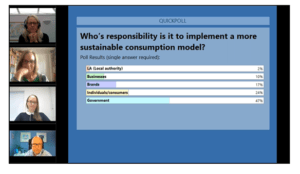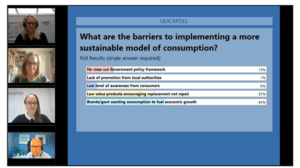What is sustainable consumption?
7th November 2022
Blog written by Sarah Ottaway, Sustainability and Social Value Lead at SUEZ recycling and recovery UK
With consumption linked to more than half of the world’s carbon emissions, and 90% of the loss in biodiversity, it’s absence from the political and business agendas is a growing concern, and a topic that SUEZ has been vocal about for a long time. We were so concerned that we travelled to Glasgow last year for COP26 to run a series of fringe events to discuss the topic, and have followed it up this year with our most recent think piece the Stuff of Life, which delves into society’s relationship with consumption, the opportunities that lie in changing how we consume and how the responsibility for this change lies with the government, business, and each of us as citizens and purchasers of all this stuff.
Not only is changing the way we consume important in reducing global climate emissions, but it is an important step in the evolution of the resources sector, as our core skills of harvesting and moving products around will remain relevant and necessary, whether it’s pre-loved furniture or refillable packaging. So, by focusing on what really needs to be managed, rather than the excess stuff that we see currently, we can transition further, faster and have a much bigger positive impact as a sector by doing so. Last week we hosted our latest webinar on the Stuff of Life report and its themes, to discuss what this all means and what needs to happen next. Joining me on the panel were Jane Beasley of Beasley Associates who co-wrote the report and Jen Gale of Sustainable(ish) who aims to help people make the best choices they can without feeling overwhelmed by “eco perfection’. Our chair, Dr. Adam Read was kept very busy by the fantastic questions, ideas and comments we received from our engaged audience throughout.
With such a large and multi-layer topic we could have easily continued beyond the hour we had available, indeed we are already planning a follow up session for early in 2023, and there were so many important points made. But the big takeaway messages for me were:
- Individual choices are powerful

Credit to Sarah Lazarovic
(https://www.sarahl.com/) for the illustration
Our money is powerful and sends signals to business and political decision makers, so choosing to refill, using a sharing app and making decisions based on the Buyerarchy of Needs (see right) all tell businesses and brands what options we want to see becoming the norm.
But we also need to act as champions for these options, by sharing and telling anyone who will listen or see us on social media about the positives and the co-benefits it brings, such as saving money or not having to store things you’re only going to use once. We must help people who are not as comfortable with these things to understand that a sustainable choice can be convenient, cheaper or in some way benefit them too.
- Government and policy makers need to send the right signals to stimulate systemic change
Our audience overwhelmingly told us that they thought UK government were the main body responsible when it comes to effectively changing how we consume (47% of responses).

From the underwhelming DEFRA waste prevention programme to wider UK producer responsibility reforms and the emissions trading scheme, key government departments such as DEFRA, BEIS and HM Treasury have the power to trigger the systemic change that is necessary to support and encourage more positive and responsible behaviours. This can be done through taxes, targets and policy measures that signal their support for a change in how we consume, from taxing the full carbon impact of a product to reducing the economic barriers for reuse and repair. Once triggered then business and citizens can turn this into action and share it with others in their social and professional circles.
- Changing how we consume will be good for business
Currently, most of the widely acknowledged approaches regarding positive consumption habits are reliant on volunteers or do not have the widespread support needed to allow them to scale up. To create systemic change these examples need to become businesses that are accessible when they’re needed, can pay people a real wage to run them and attract entrepreneurs to develop them and keep them relevant. SUEZ estimates that if every person in the UK had just one item repaired a year by specialist and trained staff, this alone would generate in £1.3 billion of revenue.

Ultimately, we cannot recycle our way out of the climate emergency we face, and increasingly more experts are coming around to this reality, which is why SUEZ continue to be so vocal about addressing consumption and focusing on waste prevention wherever possible.
If government, businesses and each one of us as consumers are serious about tackling and preventing climate change, then we need to get serious about consumption, and do so soon!
If you missed the webinar, you can watch it back here and please join the debate as momentum builds around this critical issue.
Tweet